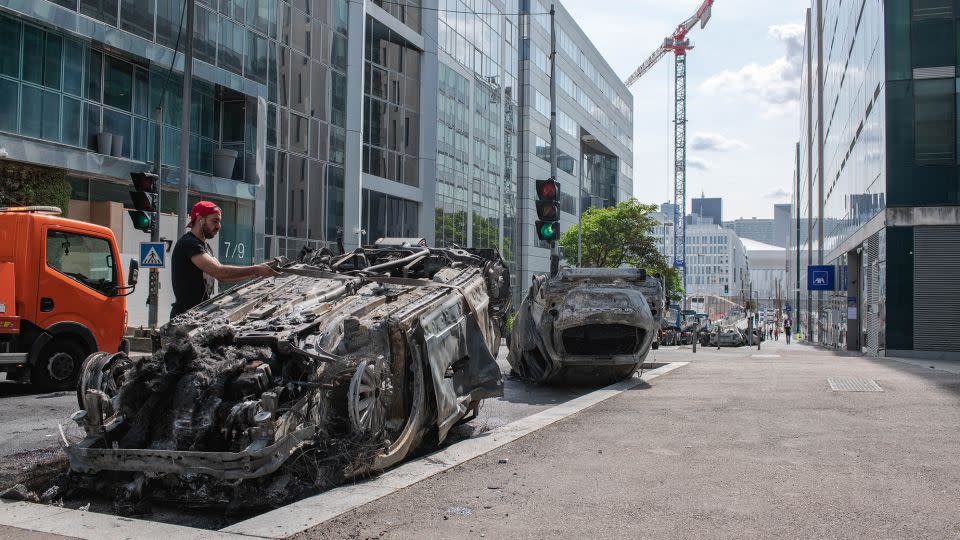Violent protests challenge French view on race
What does it mean to be French?
It’s been more than 1,500 years since the first French kingdom was founded; more than 480 years since French became the state’s official language; more than 200 years since the French Revolution; and more than 60 years since the establishment of the Fifth Republic.
Yet an answer to the question of how to define French identity remains a point of contention that helps to explain why, three days after a 17-year-old boy was shot to death by a French police officer, burnt-out cars, shattered glass windows and other signs of furor surround the makeshift memorial where the teen took some of his last breaths.
Though the violence has been committed by a small number of protesters, anger and frustration has been palpable among many young people of color who live in France’s multiethnic suburbs, who believe race was a factor in the death of Nahel, who was reportedly of Algerian descent.
Activists have long claimed that police treat French people of color differently than their White peers, pointing to cases like that of Adama Traore, a black man who died of asphyxiation while handcuffed in 2016. According to a 2017 study by one independent human rights group, young men perceived as Black and Arab are 20 times more likely to be stopped by police than their peers.
The state, however, rebuts claims that racism in the police force is a problem. And a longstanding ideal that the state is colorblind and all citizens are French first has made it particularly difficult to convince government officials to broach the possibility that implicit biases may play a part in the treatment of France’s ethnic minorities.
“Many young people in the suburbs, in the poorest neighborhoods, those whose parents in Paris are immigrants (from) Africa, the Caribbean and also Asia, know they are the first target of police brutality,” journalist and activist Rokhaya Diallo told CNN.
“Many of them express concerns about racism, about police brutality – it’s something that really comes to them at an early age.”
A colorblind republic
Official French philosophy is that all citizens are French first and that the state must resolutely avoid differentiating between them, even to the point that civil servants must refrain from wearing religious symbols.
That vigorous adherence to equality often prevents the government from doing anything that would appear to categorize French citizens based on race, including collecting statistics.
“We have this mythology of the Republic, a colorblind Republic … an egalitarian society where you don’t judge people based on their religion or skin color,” said Daniele Obono, a French lawmaker from the far-left France Unbowed party. “But at the same time, there’s a big gap between our ideals and the reality.”
Those idealistic virtues clash with the reality of race relations in France’s post-colonial 21st century society, a melting pot of diverse communities, many of whose families trace their roots back to former French colonies.
“Foreignness” is often something that is seen as inherited by blood, explained Mame-Fatou Niang, the director for the Center for Black European Studies & the Atlantic at Carnegie Mellon University.
“We’re talking people who have been in France for 100 years or half a century, but are still considered foreigners, strangers foreign to France, even though they are French citizens,” she said.
Racism itself is often treated as a foreign concept in France, so much so that the French language often doesn’t have its own words to discuss race-related issues, Niang pointed out.
French people often use anglicisms to address issues of race rather than the French equivalent – for example, Black people are referred to as “Black” rather than “noire,” the French word for black – despite the aversion of the francophone world to the rising usage of English in French culture.
“It’s akin to someone being sick, having cancer and asking his doctor to remove the word cancer from the dictionary,” said Niang. “We have to accept that we’re sick. We have to accept that this disease of racism is not exclusive to the United States.”
‘This is not about disenfranchised neighborhoods’
Several French officials have so far rejected the idea that racism was at play in Nahel’s death.
An Elysee spokesperson on Friday emphasized that this was an “individual act” that does not represent the police at large. The French Foreign Ministry said in a statement Friday that “any accusation of systemic racism or discrimination by the police in France is totally unfounded.”
“France, and its police forces, fight with determination against racism and all forms of discrimination. There can be no doubt about this commitment,” the ministry said.
“This is not the revolt of neighborhoods, this is not about disenfranchised neighborhoods,” the Elysee spokesperson said. “These are the acts of a delinquent minority.”
Suburbs like Nanterre, where Nahel was shot, have historically been home to more immigrants and face higher unemployment rates than city centers. A quarter of the population of Nanterre, the Paris suburb where Nahel lived and was killed, was made up of immigrants as of 2018, the latest years figures are available. Unemployment there among those 15-24 years old in Nanterre was 23.1% as of 2020.

To what extent the government will be able to stymie the unrest is unclear. Support for Macron and his ministers has plummeted since they pushed through extremely unpopular pension reforms that were divisive enough that the government felt it necessary to launch a 100-day plan to heal and unite the country.
Nahel’s mother has suggested that race did play a part in her son’s death, though she has also said she does not blame the entire police force – just “the one who took my son’s life.”
“He saw an Arab face, a little kid, and wanted to take his life,” she said.
CNN’s Dalal Mawad and Joseph Ataman contributed to this report.
For more CNN news and newsletters create an account at CNN.com

